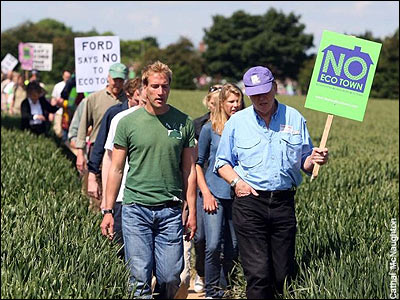Eco Towns: A Smokescreen For Property Developers
Posted by keith on June 25th, 2008
Tim Henman, erstwhile British tennis hero, is on the rampage, as only a tiger can be (ok, I’m stretching the truth slightly) — but something must be up when a former mild-mannered sports personality takes to the streets protesting about a development. In fact these developments, all ten of them in the final list, are supposed to be the very kinds of things that we should have been protesting to have more of. As the UK Government web site states:
At the beginning of the 21st Century our greatest environmental challenge is from climate change. As housing accounts for 27 per cent of carbon emissions, we need to substantially cut emissions from new homes and work towards zero carbon housing and development.
It also says:
We have seen strong support across the private sector, local government and local communities for building more affordable homes alongside higher environmental standards. Now we want local areas to come forward with ideas on how to put these principles and ambitions into practice – with a new generation of eco-towns.
Now why, I wonder, would the strongest support have come from the private sector? Tristram Hunt of The Guardian, takes up the story:
All too predictably, Britain’s leading developers are using the eco-town template to dust off long-rejected proposals and re-submit shoddy housing schemes. It is up to housing minister Caroline Flint to save this Brownite policy from descending into another predictable fight between Nimbys and developers.
Unfortunately, the response of the housebuilding industry has been a series of cunning attempts to revive planning permission for previously rejected projects. In Micheldever, Eagle Star Insurance has been trying to develop a London-Basingstoke commuter settlement since the mid-1970s. But with a sprinkling of “sustainable development” and “carbon-neutral” buzzwords, the bog-standard scheme for 12,500 homes on a pristine, greenfield site has magically transformed itself into an “eco-town”.
The private companies get their developments, the government gets their eco-credentials, and the councils — who ultimately make sure everything is done in the right way — get a few nice back-handers, just as all councils have done since time immemorial.
It’s not looking good for anyone who actually wants to find a better place to live, according to The Daily Telegraph:
An official report on eco-towns will today find that only “two or three will have real eco credentials” and most of the 15 proposals are “just housing estates in the countryside with a green label attached”.
The report by a panel of leading experts in town planning, house building, transport and environment issues will send most of the proposals back to planners with a “must do better note”.
A source on the panel told The Daily Telegraph: “No more than two or three will really be eco-towns. But pressure from ministers will demand 10 [be built] even if some do not meet the environmentally friendly criteria.”
Why do we need “eco towns” anyways? Here’s a list of things the development enthusiasts in governments, private companies and councils of the world will never contemplate, because there’s nothing in it to fill their pockets:
1) Refurbishment of existing housing stock — refurbishment has far lower “embodied energy” simply because new construction materials aren’t required. Construction materials in new homes take decades of “zero carbon” occupation to offset.
2) Redevelopment of unwanted or obsolete commercial buildings — again, lower embodied energy, and also a far greater potential for communal / community living.
3) Opting out of conventional housing completely — whether it’s in a roundhouse, a yurt or something else off-grid and rewilded, this requires a reconnection with the real world: something civilization simply will not tolerate.





